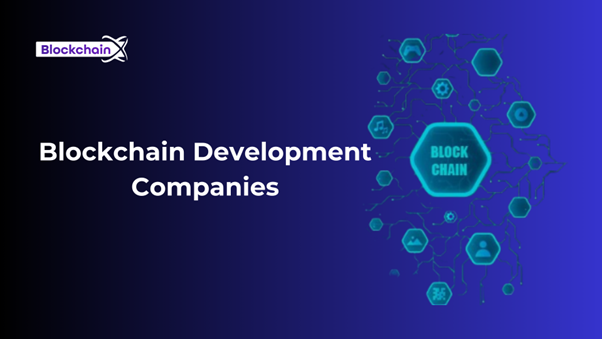Introduction:
In the digital age, blockchain technology has emerged as a revolutionary force, promising transparency, security, and efficiency across various industries. From finance to healthcare, supply chain to voting systems, blockchain’s potential is vast and transformative. This comprehensive guide explores the intricacies of private blockchain development, smart contracts, decentralized applications (DApps), and enterprise solutions, shedding light on their significance and applications in today’s dynamic landscape.
In a simple definition, a blockchain can be considered as a distributed ledger that stores data (for example, transactions across a peer-to-peer network) in a secure and immutable manner. Harnessing the potential of this innovative tool for its application in day-to-day business activities leads to the development of enterprise blockchain. The invention of enterprise blockchain technology has paved the way for the substantial growth of various industries.
Here are some key characteristics of private blockchain development:
Permissioned Access: Private blockchains require participants to be granted permission to join the network. This permission can be managed centrally by an entity or through a consensus mechanism among network participants.
Centralized or Consortium Control: Private blockchains are typically controlled by a single organization (centralized) or a consortium of organizations (consortium). This allows the network operators to maintain control over the governance, access rights, and consensus mechanisms.
Greater Efficiency: Private blockchains often prioritize efficiency and scalability over decentralization. Since they have a limited number of participants, consensus mechanisms can be designed to achieve higher transaction throughput and lower latency compared to public blockchains.
Enhanced Privacy: Private blockchains offer greater privacy and confidentiality since the participants are known entities. Encryption techniques can be employed to ensure that sensitive information is only visible to authorized parties.
Customization: Private blockchain development allows for customization of the underlying blockchain protocol and smart contract logic to meet the specific requirements of the participating organizations. Enterprise blockchain development flexibility enables tailored solutions for various use cases, such as supply chain management, identity verification, and financial transactions.
Security and Trust: While private blockchains may sacrifice some decentralization compared to public blockchains, they can still provide security and trust through cryptographic techniques and consensus mechanisms. Participants rely on the integrity of the network operators and the consensus rules established within the network.
Smart Contract Development & Audit
Smart contract development and audit are essential components of building secure and reliable decentralized applications (DApps) on blockchain platforms like Ethereum. Let’s break down each aspect:
Smart Contract Development:
Definition: Smart contracts are self-executing contracts with the terms of the agreement directly written into code. They automatically enforce and execute the terms of the contract when predefined conditions are met.
Programming: Smart contracts are typically written in programming languages supported by the blockchain platform they are deployed on. For example, Ethereum smart contracts are written in languages like Solidity or Vyper.
Functionality: Smart contracts can perform various functions, such as transferring digital assets (cryptocurrencies or tokens), managing permissions and access control, executing business logic, and interacting with other smart contracts or external systems through transactions.
Deployment: Once developed, smart contracts are deployed onto the blockchain network, where they reside at a specific address and are accessible to other participants.
Smart Contract Audit:
Purpose: Smart contract audit is a security-focused review process aimed at identifying vulnerabilities, bugs, or design flaws in the smart contract code before deployment. It helps ensure that the smart contract behaves as intended and is resistant to attacks or exploits.
Types of Audits:
Code Review: Enterprise blockchain development company and auditors examine the smart contract code line by line to identify issues related to logic errors, security vulnerabilities, and best practices adherence.
Security Analysis: Auditors conduct various security tests, such as automated vulnerability scans, static code analysis, and dynamic testing (e.g., fuzzing) to detect potential threats like reentrancy attacks, integer overflows, or unauthorized access.
Functional Testing: Auditors test the smart contract’s functionality against predefined use cases and scenarios to ensure that it behaves as expected under different conditions.
Documentation and Recommendations: The audit process typically results in a detailed report that documents identified issues, provides recommendations for improvements, and suggests best practices for enhancing the security and reliability of the smart contract.
Blockchain Integrated Solutions
Blockchain integrated solutions refer to the integration of blockchain technology into existing systems, processes, or applications to enhance their functionality, security, transparency, and efficiency. These solutions leverage the unique properties of blockchain, such as immutability, decentralization, and cryptographic security, to address specific business challenges or requirements.
Here are some key aspects of blockchain integrated solutions:
Integration with Existing Systems: Blockchain integrated solutions often involve integrating blockchain technology with existing enterprise systems, such as ERP (Enterprise Resource Planning), CRM (Customer Relationship Management), supply chain management, or financial systems. This integration allows for seamless data exchange and interoperability between blockchain-based applications and legacy systems.
Enhanced Transparency and Traceability: By utilizing blockchain’s transparent and immutable ledger, integrated solutions can provide enhanced transparency and traceability throughout various processes, such as supply chain tracking, product provenance, or transaction history. This helps in ensuring data integrity, reducing fraud, and improving accountability.
Improved Security: Blockchain integrated solutions can enhance security by leveraging cryptographic techniques and consensus mechanisms inherent in blockchain technology. Data stored on the blockchain is tamper-resistant and cryptographically secured, reducing the risk of data manipulation or unauthorized access.
Efficiency and Cost Savings: Blockchain integration can streamline processes, automate workflows, and eliminate intermediaries, leading to improved efficiency and cost savings. Smart contracts, a key feature of blockchain technology, can automate the execution of predefined business logic, reducing the need for manual intervention and speeding up transaction processing.
Decentralized Applications (DApps): Blockchain integrated solutions may involve the development of decentralized applications (DApps) that run on blockchain networks. These DApps leverage the decentralized nature of blockchain to provide services without relying on central authorities, thus promoting trustlessness and decentralization.
Use Cases: Blockchain integrated solutions find applications across various industries and use cases, including supply chain management, logistics, healthcare, finance, identity management, voting systems, and more. For example, a supply chain management solution may utilize blockchain to track the provenance of goods from manufacturer to end consumer, ensuring authenticity and compliance with regulations.
Enterprise Blockchain Consulting
Enterprise blockchain consulting involves providing expert guidance, advice, and strategic support to businesses and organizations seeking to leverage blockchain technology for their operations, processes, or products. Here’s a breakdown of what enterprise blockchain consulting typically entails:
Understanding Business Needs: Enterprise blockchain consultants work closely with clients to understand their specific business challenges, objectives, and requirements. This involves conducting thorough assessments of existing systems, processes, and pain points to identify areas where blockchain technology can provide value.
Blockchain Education and Awareness: Many businesses may not fully understand blockchain technology and its potential implications. Consultants help bridge this knowledge gap by providing education and raising awareness about blockchain fundamentals, use cases, benefits, and risks.
Strategy Development: Based on the client’s business needs and objectives, consultants formulate strategic plans for the adoption and integration of blockchain technology. This includes defining use cases, selecting appropriate blockchain platforms or protocols, outlining implementation roadmaps, and assessing potential risks and challenges.
Use Case Identification: Enterprise blockchain consultants assist clients in identifying and prioritizing suitable use cases where blockchain technology can bring significant value. This involves analyzing processes, data flows, and interactions within the organization and with external partners to identify areas where blockchain’s transparency, security, and efficiency can make a difference.
Technology Evaluation and Selection: With a multitude of blockchain platforms, protocols, and solutions available, consultants help clients evaluate and select the most appropriate technologies for their specific use cases. This may involve assessing factors such as scalability, security, consensus mechanisms, interoperability, and regulatory compliance.
Proof of Concept (PoC) Development: To validate the feasibility and potential benefits of blockchain solutions, consultants often assist in developing proof of concepts or prototypes. These PoCs serve as experimental implementations to demonstrate how blockchain technology can address specific business challenges or improve processes in a real-world setting.
Regulatory Compliance and Governance: Blockchain consultants advise clients on regulatory considerations and compliance requirements relevant to their industry and jurisdiction. They also help design governance frameworks and establish best practices for managing blockchain networks, data privacy, identity management, and compliance with relevant laws and regulations.
Blockchain Upgrades & Maintenance
Blockchain upgrades and maintenance involve the ongoing processes of improving, updating, and sustaining the functionality, security, and performance of a blockchain network or system. These activities are essential to ensure the continued reliability, scalability, and relevance of the blockchain infrastructure over time. Here’s an overview of blockchain upgrades and maintenance:
Protocol Upgrades: Blockchain protocols, such as Bitcoin, Ethereum, or Hyperledger Fabric, undergo periodic upgrades to introduce new features, enhance security, address bugs or vulnerabilities, and improve overall performance. Protocol upgrades may involve changes to consensus mechanisms, governance models, block validation rules, or cryptographic algorithms. Upgrading the protocol often requires coordination among network participants, including miners, validators, developers, and node operators.
Software Updates: Blockchain software implementations, including node software, client libraries, and developer tools, require regular updates to incorporate bug fixes, security patches, performance enhancements, and new features. Node operators and network participants need to stay informed about software updates released by the development community or blockchain platform providers and ensure timely deployment to maintain compatibility and security.
Node Maintenance: Nodes are essential components of blockchain networks responsible for validating transactions, maintaining the ledger, and participating in consensus mechanisms. Node operators must perform regular maintenance tasks to ensure the proper functioning of their nodes, including monitoring node health, optimizing performance, managing storage resources, and troubleshooting any issues that arise. Node operators may also contribute to network security by keeping their software up to date and following best practices for node configuration and security hardening.
Data Management: Blockchain networks accumulate a growing volume of transaction data and state information over time. Effective data management practices are necessary to ensure efficient storage, retrieval, and access to blockchain data while maintaining data integrity and privacy. This may involve implementing data archiving strategies, optimizing database performance, and ensuring compliance with data retention policies and regulations.
Security Audits and Vulnerability Assessments: Regular security audits and vulnerability assessments are essential for identifying and mitigating security risks and threats to blockchain networks. Security audits involve reviewing the blockchain protocol, smart contracts, network infrastructure, and configuration settings to identify vulnerabilities, misconfigurations, or weaknesses that could be exploited by attackers.
Community Engagement and Governance: Blockchain communities play a crucial role in driving upgrades and maintaining the health of blockchain networks. Community engagement involves active participation, discussion, and collaboration among developers, users, miners, validators, and other stakeholders to propose, evaluate, and implement changes to the blockchain protocol or governance mechanisms. Effective governance frameworks ensure transparent decision-making processes, consensus building, and alignment of incentives among network participants.


